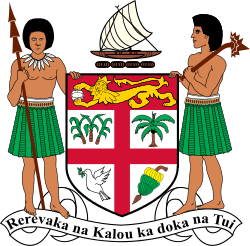1987 Fijian general election
General elections were held in Fiji between 4 and 11 April 1987.[1] They marked the first electoral transition of power in Fijian history. Despite receiving just under 50% of the vote, the Alliance Party of longtime Prime Minister, Kamisese Mara was defeated by a coalition of the Fiji Labour Party (contesting a general election for the first time) and National Federation Party, which won 28 seats to the Alliance's 24. The Labour Party's Timoci Bavadra became Prime Minister.
 |
|---|
| This article is part of a series on the politics and government of Fiji |
|
Legislative
|
|
Judiciary
|
|
Bavadra's 28-member parliamentary caucus included only seven ethnic Fijians, all of them elected with predominantly Indo-Fijian support from national constituencies. His fourteen-member cabinet included six Fijians, seven Into-Fijians and one European. Effective Indo-Fijian control of the government caused widespread resentment among the ethnic Fijian community, and after less than a month in office, the new government was deposed on 14 May in a coup d'état led by Lieutenant-Colonel Sitiveni Rabuka.
Electoral systen
The 52 members of the House of Representatives were elected from two types of constituency, with candidature in each limited to one of three ethnic groups; Fijians, Indo-Fijians and General electors, generally of European or Chinese descent.
Twenty-seven members were elected from communal constituencies (12 Fijians, 12 Indo-Fijians and 3 general) in which voters voted for someone of their own ethnicity, with the remaining twenty-five elected from national constituencies (10 Fijian, 10 Indo-Fijian and 5 general) in which candidature was limited by ethnicity but all registered voters in a constituency could vote for.
Results
| Party | Votes | % | Seats | +/– |
|---|---|---|---|---|
| Alliance Party | 484,543 | 49.5 | 24 | −4 |
| NFP–FLP | 461,056 | 47.1 | 28 | +6 |
| Fijian Nationalist Party | 14,484 | 1.5 | 0 | 0 |
| Western United Front | 8,339 | 0.9 | 0 | −2 |
| National Federation Party-Koya | 4,462 | 0.5 | 0 | New |
| Independents | 6,723 | 0.7 | 0 | 0 |
| Invalid/blank votes | 22,238 | – | – | – |
| Total | 1,001,845 | 100 | 52 | 0 |
| Total ballots cast | 250,968 | – | – | – |
| Registered voters/turnout | 353,691 | 71.0 | – | – |
| Source: Nohlen et al. | ||||
Aftermath
Following the elections Bavadra formed a fourteen member cabinet.[2]
| Bavadra cabinet | |
|---|---|
| Position | Minister |
| Prime Minister Minister for Public Service Minister for Fijian Affairs Minister for Home Affairs | Timoci Bavadra |
| Deputy Prime Minister Minister for Housing and Urban Affairs Minister for Information | Harish Sharma |
| Attorney General Minister for Justice | Jai Ram Reddy |
| Minister for Agriculture, Fisheries and Forestry | Joeli Nacola |
| Minister for Communications, Transport and Works | Ahmed Bhamji |
| Minister for Education, Youth and Sport | Tupeni Baba |
| Minister of Finance and Economic Planning | Mahendra Pal |
| Minister for Foreign Affairs and Civil Aviation | Krishna Datt |
| Minister for Health and Social Welfare | Satendra Nandan |
| Minister for Labour and Immigration | Joeli Kalou |
| Minister for Lands, Energy and Mineral Resources | Mosese Volavola |
| Minister for Trade, Industry and Tourism | Navin Maharaj |
| Minister of State for Cooperatives and Consumer Affairs | Chris Herbert |
| Minister of State for Rural Development, Rehabilitation and Relief | Temo Sukanaivalu |
References
- Dieter Nohlen, Florian Grotz & Christof Hartmann (2001) Elections in Asia: A data handbook, Volume II, p653 ISBN 0-19-924959-8
- Fiji's younger and smaller cabinet Pacific Islands Monthly, June 1987, p20